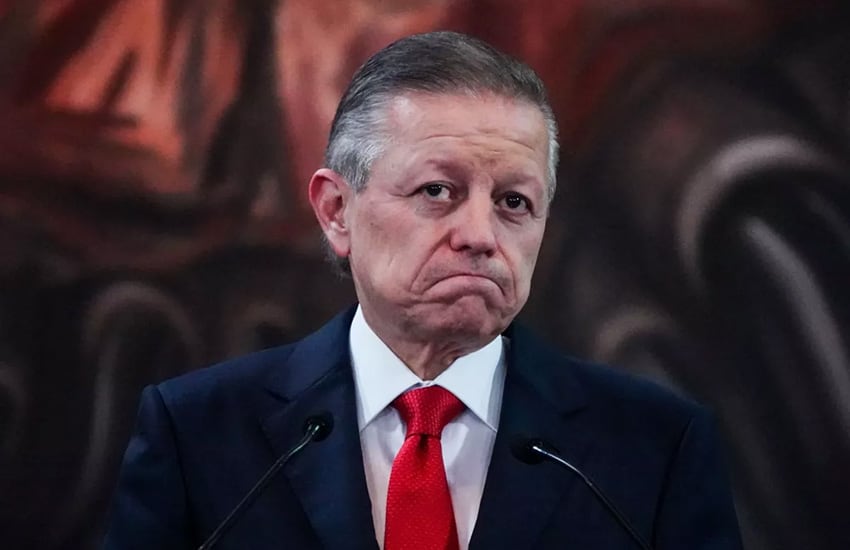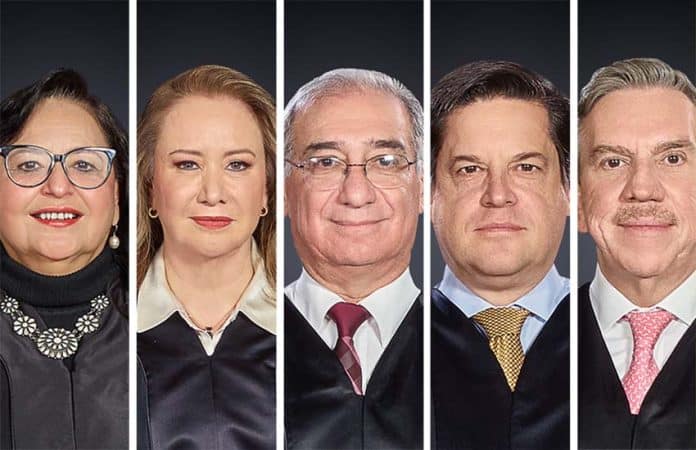Five Supreme Court (SCJN) justices are vying to succeed Arturo Zaldívar as chief justice of Mexico’s highest court.
Zaldívar’s four-year term as the court’s presidente, or chief justice, will conclude at the end of the year, and the 11 SCJN justices will elect his successor in early January.
The successful candidate will also become head of the Federal Judiciary Council (CJF), which oversees Mexico’s courts and judges.
Two women are aiming to become the court’s first female chief justice, while three men have also formally joined the contest. All five candidates have presented lengthy documents in which they set out the objectives they would pursue as chief justice and CJF head.

Brief profiles of the candidates, and summaries of their proposals, appear below. You can also read each candidate’s CV and their statements of objectives (in Spanish) at the SCJN website.
Justice Yasmín Esquivel Mossa
Esquivel has a PhD in law from Anáhuac University and worked as a public official in all three levels of government for over three decades before becoming a Supreme Court justice in 2019.
Among her proposals is to establish a commission of former SCJN justices to advise the sitting chief justice. She also advocated greater transparency of SCJN rulings and its use of public resources.
In addition, Esquivel said that civil society should have the opportunity to help create judicial policies that improve access to justice.
Justice Alfredo Guttiérez Ortiz Mena
Guttiérez completed law degrees at the National Autonomous University and at Harvard University. He worked in private practice before his appointment to the SCJN in 2012.
One of his proposals is to improve the internal administration of the Supreme Court, “demonstrating our rational and austere management of resources.”
Guttiérez set out a vision for an efficient and disciplined judicial system that is unconditionally committed to the country.
He also said that courts should be able to hold “virtual trials” and advocated the establishment of tribunals to hear environmental matters.
Justice Javier Laynez Potisek
Laynez studied law in Mexico and France before working as a federal legal official and judge. He was appointed to the Supreme Court in 2015 and became president of its second chamber in 2019.
Laynez indicated he would adopt a collaborative approach if elected chief justice of the SCJN, noting that the position is about representing the other 10 justices.
“The decisions within our sphere of work have to be collective, broad, emerging from internal dialogue and always thinking of the judicial power as a whole. There is no space for individualistic projects,” he wrote.
As chief justice, Laynez said he would work to combat the backlog in Mexico’s judicial system (some suspects languish in prison for years without trial) and publish SCJN rulings more promptly.
Justice Alberto Pérez Dayán
A constitutional and administrative law specialist, Pérez completed a doctorate degree in law at the National Autonomous University before working as a lawyer and a judge in various courts. He was appointed to the Supreme Court in 2012.
Like Laynez, Pérez indicated he would be a collaborative chief justice, and advocated the appointment of more women to high-ranking positions in Mexico’s judiciary.
Pérez also advocated greater transparency in the judicial system and argued that Federal Judiciary Council meetings on administrative matters should be public. In addition, the justice emphasized his commitment to the policy of zero tolerance for corruption in the judiciary.
Justice Norma Lucía Piña Hernández
A law and education graduate, Piña was a judge in various lower courts before her appointment to the SCJN in 2015.
As chief justice, she said she would ensure that the independence of the judiciary is upheld.
Like her colleagues, Piña advocated for greater transparency of the SCJN’s work and pledged to create a “Unit of Scientific and Specialized Knowledge” to advise justices on matters beyond their legal expertise.
She also highlighted her commitment to combating corruption within the judiciary and improving the administration of the SCJN and CJF.
